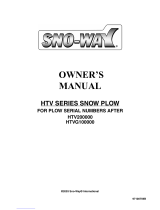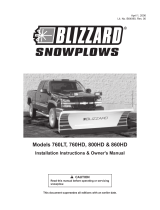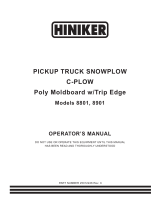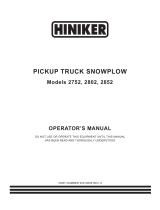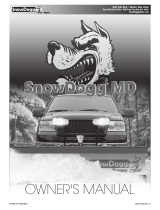Page is loading ...

Form No. 62875
December 15,1997
OWNER’S MANUAL
with
FloStatTM Hydraulic System
Dazl
SNOWPLOWS
Read this document before operating the snowplow.
This document supersedes all editions with an earlier date.

Owner’s Name:
Date Purchased:
Outlet Name:
Vehicle Model/Year:
Snowplow Type/Size:
Required Ballast:
FloStatTM Serial Number:

TABLE OF CONTENTS
TABLE OF CONTENTS
PREFACE. . . . . . . . . . . . . . . . . . 1
SAFETY PRECAUTIONS ......... 1
Safety Definitions ............ 2
Safety Precautions ............ 2
GETTING TO KNOW YOUR
SNOWPLOW ................ 4
UniMount Snowplow .......... 4
Blade ................... 4
A-Frame, Quadrant and Lift Frame ... 5
Snowplow Headlights .......... 5
Blade Accessories-Optional ...... 5
Snow Deflector ............ 5
Dolly Wheels ............. 5
Rubber Cutting Edge ......... 6
Vehicle Mount .............. 6
Hydraulic Power ............. 6
Solenoid Control ............. 7
Hydra-Turn@ Angling .......... 7
VEHICLE APPLICATION
INFORMATION .............. 8
Ballast Requirements ........... 8
MOUNTING SNOWPLOW TO
VEHICLE .................. 9
OPERATION ............... 11
Snowplow Control ........... 11
RAISE ............... 11
LOWER (Float) ........... 11
Blade FLOAT ............ 11
Angle LEFT ............. 11
Angle RIGHT ............ 11
Lock Blade in Position ....... 11
Headlight Check .......... 12
Parking with Snowplow Attached ... 12
Towing Disabled or Stuck Vehicles . . 12
Transporting the Snowplow ...... 12
Plowing Snow ............. 13
Form No. 62875
General Instructions ......... 13
Special Snow Conditions ....... 13
Hard-Packed Snow ......... 13
Deep Snow ............. 13
Clearing Driveways .......... 14
Clearing Parking Lots ......... 14
SNOWPLOW REMOVAL . . . . . . . . 15
MAINTENANCE ............. 17
Off-Season Storage .......... 17
Regular Maintenance and
Adjustments .............. 17
Hydraulic System ........... 18
Annual Fluid Change ........ 19
System Capacity .......... 19
Packing Nut Adjustment ...... 19
Pump Inlet Filter Screen ...... 19
Blade Drop Speed Adjustment ..... 20
Emergency Parts ............ 20
TROUBLESHOOTINGGUIDE ..... 21
December 15, 1997

PREFACE
Welcome to the growing family of WESTERN@ Your FloStatTM hydraulic unit has a serial number
snowplow owners. on the reservoir. Record this serial number in the
This manual provides safety, operation,
maintenance, and troubleshooting information for
your new WESTERN snowplow. To keep your
snowplow in good condition, read and understand
this manual and follow its recommendations.
Failure to do so may affect your warranty.
front of the manual. Before using your WESTERN
snowplow, make sure your vehicle is equipped with
all vehicle manufacturer’s and Western’s
recommended options for snowplowing.
When service is necessary, your local Western
Products outlet knows your snowplow best. Return
your snowplow to the outlet for maintenance
service or any other assistance you may require.
We have enclosed a “Report Card” in your owner’s
manual packet for your use.
Form No.62875 1 December 15.1997

SAFETY INFORMATION
Indicates a potentially hazardous
situation that, if not avoided, could result
in death or serious personal injury.
dk CAUTION
Indicates a situation that, if not avoided,
could result in minor personal injury
and/or damage to product or property.
NOTE: Identifies tips, helpful hints and
maintenance information the
owner/operator should know.
BEFORE YOU BEGIN
l
Park the vehicle on a level surface, place
shift lever in PARK or NEUTRAL and set
parking brake.
Remove blade assembly before placing
vehicle on hoist.
l
Leave the snowplow mounted on the vehicle
and lowered for most service procedures,
unless told otherwise.
PERSONAL SAFETY
l
Wear only snug-fitting clothing while
working on your vehicle or snowplow.
l
Do not wear jewelry or a necktie, and secure
long hair.
l
BtCespecially careful near moving parts
such as fan blades, pulleys and belts.
0 Wear safety goggles to protect your eyes
from battery acid, gasoline, dirt and dust.
l
Avoid touching hot surfaces such as the
engine, radiator hoses and exhaust pipes.
l
Always have a fire extinguisher rated BC,
for flammable liquids and electrical fires,
handy.
Do not exceed GVWR or GAWR
(including blade and ballast) as found on
the driver-side door cornerpost of the
vehicle.
VENTILATION
Vehicle exhaust contains deadly carbon
monoxide (CO) gas. Breathing this gas,
even in low concentrations, could cause
death. Never operate a vehicle in an
enclosed area without venting exhaust to
the outside.
If you work on the vehicle or snowplow in a garage
or other enclosed area, be sure vent exhaust gas
directly to the outside through a leakproof exhaust
hose.
FIRE AND EXPLOSION
Gasoline is highly inflammable and
gasoline vapor is explosive. Never
smoke while working on vehicle. Keep
all open flames away from gasoline tank
and lines. Wipe up any spilled gasoline
immediately.
Be careful when using gasoline. Do not use
gasoline to clean parts. Store only in approved
containers away from sources of heat or flame.
Form No.62875 2 December 15,1997

SAFETY INFORMATION
HYDRAULIC SAFETY
Hydraulic oil under pressure could cause
skin injection injury. If you are injured
by hydraulic oil, get medical treatment
immediately.
l
Always inspect hydraulic components and
hoses before using. Replace any damaged or
worn parts immediately.
l
If you suspect a hose leak, DO NOT use
your hand to locate it. Use a piece of
cardboard or wood.
BATTERY SAFETY
;g CAUTION
Batteries normally produce explosive
gases which can cause personal injury.
Therefore, do not allow flames, sparks or
lit tobacco to come near the battery.
When charging or working near a
battery, always cover your face and
protect your eyes, and also provide
ventilation.
Batteries contain sulfiric acid which
burns skin, eyes and clothing.
Disconnect the battery before removing
or replacing any electrical components.
Form No.62875 3 December 15,1997

GETTING TO KNOW YOUR SNOWPLOW
PRO-PLOW Blade
Quadrant
Sport/Utility Blade
’ Stand
UniMount Snowplow
A UniMount snowplow consists of all the
components that are readily removable from the
vehicle as a unit. This includes the blade, quadrant,
A-frame, lift frame, stand, hydraulic unit, and
snowplow headlights.
There is no need to unhook the chain or the
hydraulic hoses. When the lift frame is pinned to
the stand and locked in place (see blade label or
snowplow removal section of this manual), the
complete UniMount snowplow can easily be
moved around on most hard surfaces.
Blade
WESTERN@ snowplows with steel blades are
constructed of heavy gauge steel. To increase
rigidity and strength, the blade is reinforced with
several vertical ribs. The top edge is formed for
added strength and improved appearance.
WESTERN snowplows with poly blades are
constructed of a high molecular weight
polyethelene sheet that is supported with structural
steel. The blade comes equipped with a rubber
snow deflector.
The exclusive Roll-ActionTM blade is designed to
roll snow ahead and to the side instead of just
pushing snow. This action means you can move
more snow and move it faster using less power,
saving fuel and reducing wear and tear on both the
vehicle and the snowplow.
The blade has a replaceable high-carbon steel
cutting edge bolted to the bottom. This cutting edge
is reversible, side-to-side, to equalize wear (except
sport/utility snowplows). Replace when it is worn
to the bottom edge of the blade. (See the
Maintenance section.)
Form No.62875 4 December 15,1997

GETTING TO KNOW YOUR SNOWPLOW
The blade also features large, adjustable disc-type
skid shoes. These rotate 360” for longer wear and
better blade flotation over all surfaces. For severe
service, heavy-duty disc shoes are available from
your local Western Products outlet. Heavy-duty
disc shoes are standard on PRO-PLOW and Heavy
Weight snowplows.
Your new blade’s steel components are protected
with a PRO-GUARDTM coating-a baked-on
powder finish.
Blade guides with replaceable flags are furnished
with your complete snowplow. These help
improve operator visibility and blade control.
A-Frame, Quadrant and Lift Frame
The quadrant is attached to the back of the blade
with bolts, locknuts, and heavy-duty trip springs.
The trip springs allow the blade to trip forward and
ride over obstacles such as low curbs, manhole
covers, etc. without damaging the blade or the
vehicle, or injuring the driver. See the Regular
Maintenance and Adjustments section for Trip
Spring Adjustment.
The quadrant is attached to the triangular A-frame
with a pivot bolt. The pivot bolt allows the
quadrant and blade to swing right or left. Heavy 1”
diameter hitch pins secure the A-frame ears to the
vehicle mount. These hitch pins cannot be bent and
will not shear in normal operation. This provides a
solid connection.
The lift frame is hinged to the rear angle of the
A-frame with clevis pins. The hydraulic unit is
mounted on the front of the lift frame. The hoses
remain connected to the hydraulic unit and the
Hydra-Turn@ rams. The snowplow headlights are
also attached to the lift frame.
Snowplow Headlights
The headlights include a set of rectangular,
dual-beam, halogen headlamps plus combination
park and turn signals.
A patented pre-wired harness with plug-in
connectors requires no headlamp wire splicing.
The headlights conform to federal safety standards.
Connecting the snowplow plugs when mounting
the snowplow will automatically switch the vehicle
headlights to the snowplow headlights when they
are in the ON position.
Disconnecting the snowplow plugs when removing
the snowplow will automatically switch the
snowplow headlights to vehicle headlights when
they are in the ON position.
Before traveling, position the blade so it
does not block headlight beam. Do not
change the blade position while traveling.
Replacement 2El sealed beam headlamps are
available through your local Western Products
outlet.
Blade Accessories-Optional
Snow Deflector
The optional snow deflector, available in poly or
reinforced rubber, keeps snow off the windshield
and away from the radiator. The deflector
improves the Roll-ActionTM feature and increases
snowplow efficiency. The snow deflector is
standard on poly snowplows, but is not available
for sport/utility blades.
Dolly Wheels
The optional dolly wheels provide easy snowplow
maneuvering on any hard surface and simplify
snowplow positioning for hook-up. Dolly wheels
are standard for the heavy weight blade and are
available as an accessory for the PRO-PLOW and
Poly PRO-PLOW snowplows.
Continued on next page.
Form No.62875 5 December 15,1997

GETTING TO KNOW YOUR SNOWPLOW
Rubber Cutting Edge
The rubber cutting edge is made of resilient rubber
compounds that allow for a longer lasting cutting
edge. It adjusts easily to road surface irregularities
without gouging and removes all types of snow
quickly and cleanly. The rubber cutting edge is
available for all snowplows, except the sport/utility
blade.
Vehicle Mount
Western has designed custom mounts for most
vehicles. Due to differences between vehicle
models, mounts are generally not interchangeable.
The mount is fastened to the underside of the
vehicle frame and provides the primary connecting
point between the snowplow and the vehicle.
It has two pinned link arms (normally attached to
mount). The link arms attach to two studs on
Eift frame when the snowplow assembly is
attached to the vehicle. See Figure 1.
/
., Electrical
Mount / 1” Hitch
Pin
Hydraulic Power
Western’s Solenoid FloStatTM system provides a
fast and uniform speed for lifting and angling. See
Figure 2.
r
IP-Volt
(POCSfJeie)
\
Oil Fill
Plug/Dipstick
II
Ground
L
FloStat Hydraulic System
Figure 2
The system raises the blade in 2 seconds and angles
side to side in less than 4 seconds. The heavy
weight system angles side to side in 8 seconds.
For fluid type and filling instructions, see System
Capacity.
Form No.62875
Figure 1
6 December 15.1997

GETTING TO KNOW YOUR SNOWPLOW
Solenoid Control
The solenoid control is electrically powered
through the ignition (key) switch of your vehicle
and is protected by a replaceable 6-amp in-line
fuse. The ON/OFF switch allows you to turn off
the control and prevent blade movement even when
the ignition is on. See Figure 3.
(
IN/OFF Switch
SOLENOID CONTROL
Figure 3
Hydra-Turn* Angling
Hydra-Turn angling gives you full control of the
snowplow from within the cab of the vehicle- you
will never have to get out in the snow to change the
angle of the blade. Two single-acting hydraulic
rams hold the blade at the desired angle. The rams
are operated by the solenoid control.
The solenoid FloStatTM valve manifold has two
relief valves built in to prevent damage to the blade
or vehicle if obstacles are hit. When the force
against the blade causes pressure in an extended
ram to exceed set limits, the cushion valve opens
allowing oil to escape and the ram plunger retracts.
See Figure 4.
The driver shall keep bystanders clear of
the blade when it is being raised,
lowered or angled. Do not stand
between the vehicle and the blade or
within 8 feet of a moving blade. A
moving or falling blade could cause
personal injury.
Relief Valve
(Driver Side) ef Valve
rb Side)
HYDRA-TURN ANGLING
Figure 4
Form No.62875 7 December 15,1997

VEHICLE APPLICATION INFORMATION
Vehicle application recommendations are based on
the following:
l
The vehicle with the snowplow installed
must comply with applicable Federal Motor
Vehicle Safety Standards (FMVSS).
l
The vehicle with the snowplow installed
must comply with the vehicle manufacturer’s
stated gross vehicle and axle weight ratings
(found on the driver-side door corner-post of
the vehicle) and front and rear weight
distribution ratio. In some cases, rear ballast
may be required to comply with these
requirements. See Ballast Requirements
section.
l
Available capacity for the snowplow
equipment is based on a representative
vehicle equipped with options commonly
used for snowplowing and with 300 lb. of
front seat occupant weight.
l
In some cases there may be additional
limitations and requirements such as special
vehicle options and recommendations, or
airbags/lift kits.
l
Installation, modification, and addition of
accessories must comply with published
Western Products recommendations and
instructions. Available capacity decreases as
the vehicle is loaded with cargo or other
truck equipment or snowplow accessories
are installed.
l
If there is uncertainty as to whether available
capacity exists, the actual vehicle as
configured must be weighed.
outlet for any questions on snowplow
applications or recommendations.
Ballast Requirements
Ballast (additional weight) is an important part of
qualifying vehicles for snowplow eligibility. Rear
ballast must be used when recommended to remain
in compliance with axle ratings and ratios as
specified by the vehicle manti¶acturer.
If ballast is required, it is important that it be
secured properly behind the rear axle. A ballast
retainer kit is available from Western Products, PN
62849.
NOTE:
The ballast retainer kit is for plow
vehicles requiring ballast in the bed of the
truck. See your Western Products outlet for the
correct amount of ballast requirement. With
this retainer, subtract 50 lb. for the weight of
the retainer. Sand bags are recommended for
ballast weight. See Figure 5 for ballast retainer
example.
BALLAST
Figure 5
Form No.62875 8 December 15.1997

MOUNTING SNOWPLOW TO VEHICLE
A-FRAME \ STAND
Figure 6
Inspect snowplow components and bolts
for wear or damage when mounting or
removing the snowplow. Worn or
damaged components could allow the
snowplow to drop unexpectedly.
Do not put finger(s) in A-frame ear or
coupling lug holes to check alignment.
Personal injury could occur if the
snowplow moves.
See Figure 6 for the steps below.
1. Remove the electrical covers.
2. Position the snowplow close to the vehicle.
3. Pull the lock pin to unlock the stand from the
A-frame.
4. Rotate the lift frame toward the vehicle to align
the hitch pin holes.
NOTE:
Adequate chain slack is necessary for
connecting pin hole alignment.
5. Attach the A-frame to the vehicle using two
hitch pins.
See Figure 7 for the steps below.
1. Rotate the lift frame towards the vehicle and
swing the link arm up to position the link arm
hole over the lift frame stud.
LIFT
FRAME
\
Figure 7
2. Slide the link arm onto the stud.
3. Install the hairpin onto the stud.
4. Repeat steps l-3 to the other side.
Continued on next page.
Form No.62875 9 December 15.1997

MOUNTING SNOWPLOW TO VEHICLE
STAND
ELECTRICAL
PLUGS + q+
LIFT
FRAME
/
m I
Figure 8
Keep clear of the blade when it is being
raised, lowered, or angled. Do not stand
between the vehicle and the blade, or
within 8 feet of a moving blade. A
moving or falling blade could cause
oersonal iniurv.
See Figure 8 for the step below.
Pull the stand pin to release the stand from the lift
frame.
Figure 9
NOTE:
Use dielectric grease to prevent
corrosion on all electrical connections. Fill
receptacles and lightly coat ring terminals and
blades before assembly.
See Figure 9 for the steps below.
1. Rotate the stand to the storage position.
2. Use the stand pin and the lock pin to attach the
stand to the A-frame.
3. Connect the electrical plugs.
Form No.62875 10 December 15,1997

OPERATION
Snowplow Control
Angle LEFT
Turn the vehicle ignition (key) switch to the ON or
the ACCESSORY position.
Move the control ON/OFF switch to the ON
position. The control indicator light (red) should
light whenever the control ON/OFF switch and the
ignition (key) switch are both turned on. See
Move the control lever to LEFT to angle the blade
to the left. Hold the control lever here until the
blade has reached the desired position.
Angle RIGHT
w-e 10.
,---- ~--
Move the control lever to RIGHT to angle the blade
to the right. Hold the control lever here until the
blade has reached the desired position.
Lock Blade in Position
ONTROL
LEVER.
RAISE
Figure 10
Move the control lever forward to raise the blade.
LOWER (Float)
Move the control lever backward to lower the blade.
Blade FLOAT
Blade float allows the blade to move up and down
to follow the contour of the surface being plowed.
Moving the control lever to LOWER will
automatically set control to FLOAT position (even
when the lever returns to the neutral position). To
cancel float, move the control lever to RAISE.
With the control lever in the neutral position, turn
the control ON/OFF switch to OFF. The blade is
now locked and cannot be accidentally moved.
To prevent accidental movement of the
blade, always turn the ON/OFF switch to
OFF whenever the snowplow is not in
use. The control indicator light will turn
;;lil CAUTION
DO NOT hold solenoid control lever in
RAISE, angle LEFT or angle RIGHT
position for more than 2 seconds after
blade has reached desired position. To
do so increases battery drain and could
result in motor burn-out.
Turning off the control ON/OFF switch or the vehi-
cle ignition (key) switch will also cancel float. An-
gling LEFT or RIGHT does not cancel float.
Form No.62875 11 December 15.1997

OPERATION
Headlight Check
With both snowplow plugs connected, check the
operation of vehicle and snowplow headlights. See
below:
l
Parking Lights-Both vehicle and snowplow
parking lights should be on.
l
Right Turn Signal-Both vehicle and
snowplow right turn signal lights should
flash.
l
Left Turn Signal-Both vehicle and
snowplow left turn signal lights should flash.
With the vehicle headlight switch in the ON
position, connecting and disconnecting either
snowplow plug should switch between the vehicle
and the snowplow headlights as follows:
l
Snowplow plug is DISCONNECTED-
Vehicle headlights should light; snowplow
headlights should not light.
l
Snowplow plug is CONNECTED-
Snowplow headlights should light; vehicle
headlights should not light.
Aim the snowplow headlights with the snowplow
mounted and raised in the travel position. Aim the
vehicle headlights with the snowplow removed
from the vehicle.
Parking with Snowplow Attached
Whenever you park your vehicle, lower the blade to
the ground.
Lower the blade when the vehicle is
parked. Temperature changes could
change hydraulic pressure causing the
blade to drop unexpectedly or cause
damage to hydraulic components.
Failure to do this could result in serious
personal injury.
Towing Disabled or Stuck Vehicles
DO NOT use any part of the snowplow assembly as
an attachment point when retrieving, towing, or
winching a disabled or stuck vehicle.
Transporting the Snowplow
NOTE:
These instructions are for driving short
distances to and from plowing jobs. For long
trips, remove the snowplow from the front of
the vehicle.
1 with vehicle ~~~~~~WR. See
Rear ballast may be required to comply
Vehicle Application Information.
1. Raise the blade.
2. Adjust the blade height for maximum
snowplow light illumination.
Your vehicle must be equipped with
snowplow headlamps and directional
lights. Verify the snowplow headlamps
are operating properly before traveling.
3. Adjust the blade to the straight position.
‘& CAUTION
Before traveling, position the blade so it
does not block the headlight beams. Do
not change the blade position while
traveling.
4. Move the solenoid control ON/OFF switch to
OFF to lock the blade in place.
--
.cB? CAUTION
Transport speeds should not exceed 45
MPH. Reduce speed under adverse
travel conditions.
NOTE:
Monitor the operating temperature.
Overheating is unlikely under normal driving
conditions, but occasionally the plow may be
positioned where it deflects air away from the
radiator. If this occurs, stop the vehicle and
raise, lower or angle the plow slightly to correct
overheating.
Form No.62875 12 December 15,1997

OPERATION
Plowing Snow
NOTE:
Only the driver should be in the
vehicle when the snowplow is attached for
plowing.
General Instructions
l
Before plowing, make sure you know of any
obstructions hidden beneath the snow such
as bumper stops in parking lots, curbs,
sidewalk edges, shrubs, fences, or pipes
sticking up from the ground.
;lr CAUTION
Flag any obstructions that are hard to
locate under snow to prevent damage to
product or property.
Always wear a seatbelt when plowing
snow. Hidden obstructions could cause
the vehicle to stop suddenly resulting in
personal injury.
Plow during the storm rather than letting snow
accumulate.
l
Do not exceed 10 mph ( 16 kph) when
plowing snow.
l
When stacking snow, begin raising the blade
as you come close to the stack. This will let
the blade and its load ride up onto the stack
& CAUTION
Never pile snow with the blade angled
more than halfway. This could damage
the snowplow or the vehicle bumper.
Special Snow Conditions
Hard-Packed Snow
l
Raise the disc shoes until the cutting edge
comes into direct contact with the pavement.
See Regular Maintenance and Adjustments.
l
Use the lowest gear to place maximum
power behind the cutting edge.
NOTE:
An angled blade is more effective to
remove hard-packed snow.
Deep Snow
l
Shear off top layers by plowing with the
blade raised 3 to 4 inches for the initial pass.
l
Bite into the edges using only partial blade
width until the job is cut down to size for full
blade plowing.
Rule of thumb:
6” snow-plow with entire blade width;
9” snow-plow with 3/4 blade; and
12” snow-plow with l/2 blade.
Experience and “feel” are the best guides.
l
When plowing deep snow, be sure to keep
vehicle moving.
l
Secure ballast behind rear wheels for better
traction. (See Ballast Requirements) Do not
exceed vehicle’s GVWR and GAWR.
l
Use tire chains, where legal, for increased
traction.
Form No.62875 13 December 15,1997

OPERATION
Clearing Driveways
1. Head into driveway with the blade angled and
plow snow away from buildings.
2. Widen the driveway by rolling snow away from
buildings.
NOTE: If the building is at the end of the
driveway, plow up to within a vehicle length of
the building. Then push as much snow as
possible off driveway.
3. With a raised, straight blade, drive through
remaining snow to building.
4.. Drop blade and “backdrag” snow away from
building door at least one vehicle length.
5. Repeat if necessary.
6. Back the vehicle to the building door and plow
forward toward the street removing the
remaining snow from the driveway. Check
municipal ordinances for disposal of snow.
Clearing Parking Lots
Clear areas in front of the buildings first. With the
blade raised, drive up to the building. Drop the
blade and “backdrag” snow away from the
building. When snow is clear of the buildings, turn
the vehicle around and push snow away from the
buildings towards the outer edges of the lot.
Plow a single path down the center in the
lengthwise direction.
Angle the snowplow towards the long sides, and
plow successive strips lengthwise until the area is
cleared and snow is “stacked” around the outer
edges.
If snow is too deep to clear in the above manner,
clear main traffic lanes as much as possible.
Form No.62875 14 December 15,1997

SNOWPLOW REMOVAL
LIFT
CHANNEL \
ELECTRICAL
PLUGS
A-FRAME-l \ STAND
Figure 11
I
To avoid personal injury, follow steps in
Stand must be lowered and pinned to to
the lift frame before removing link arms.
Moving or falling assemblies could
cause uersonal iniurv.
Keep hands and feet clear of the blade,
A-frame and lift frame when removing or
mounting the snowplow. Moving or
falling assemblies could cause personal
Inspect snowplow components and bolts
for wear or damage when mounting or
removing the snowplow. Worn or
damaged components could allow the
snowplow to drop unexpectedly.
, LIFT FRAME
STAND
SHOE i
Figure 12
See Figure 11 for the steps below.
1. Adjust blade to straight position.
2. Move the control lever to LOWER.
3. Push the lift channel down.
4. Disconnect the electrical plugs.
5. Pull the stand pin and the lock pin to release the
stand from the A-frame.
During the off season, the solenoid control and
bracket can be removed from the dash/floor
bracket. Disconnect the molded connector in the
cab and remove the four mounting screws. Store
the control and the bracket in the glovebox of the
vehicle.
See Figure 12 for the step below.
Place the stand shoe on the ground. If necessary,
raise the stand slightly to align one of the holes in
the stand with the hole in the lift frame. Insert the
stand pin to attach the stand to the lift frame.
Form No.62875 15 December 15,1997

SNOWPLOW REMOVAL
LIF
Figure 13
See Figure 13 for the steps below.
1. Remove the hairpin from the lift frame stud.
2. Push the lift frame towards the vehicle to
relieve tension on the link arm and slide the link
arm off the stud.
3. Repeat steps 1 and 2 to the other side.
See Figure 14 for the steps below.
NOTE:
Move the lift frame to relieve hitch pin
tension.
1. Pull both hitch pins to release the A-frame from
the vehicle.
2. Rotate the lift frame towards the blade.
3. Use the lock pin to lock the stand to the
A-frame.
4. Move the snowplow away from the vehicle.
5. Install the electrical covers.
A-FRAME A \ STAND
Figure 14
6.lnsert the snowplow plugs into the boot.
NOTE:
Use dielectric grease to prevent
corrosion on all electrical connections. Fill
receptacles and lightly coat ring terminals and
blades before assembly.
NOTE:
For long-term storage, grease
exposed chrome surfaces of the Hydra-Turn@
rams to prevent rust.
-& CAUTION
To prevent the shock absorber of the
PRO-PLOW A-frame from collecting
water, store snowplow with A-frame in a
horizontal position.
Form No.62875 16 December 15.1997

MAINTENANCE
Off-Season Storage
Always lower the snowplow to the
ground when parked to prevent personal
Remove blade assembly before placing
the vehicle on a hoist. Failure to do this
could result in personal injury.
Before storing, use this checklist to ensure your
equipment is ready for the next plowing season.
q
q
n
q
q
q
q
q
Inspect hydraulic system for leaks and cracked
or damaged hoses. Change the oil. (See Annual
Fluid Change)
Inspect all parts of the snowplow and the vehicle
mount system for worn or broken parts.
Replace as necessary.
Disassemble, clean, and apply dielectric grease
to all electrical connections, especially grounds.
Lubricate grill connectors and snowplow plugs
with dielectric grease (P.N. 56099 or 49326).
Plug plow harness and cable assembly into cable
boot. Install plug cover on vehicle harness and
cable assembly.
Check the snowplow vehicle mount and
tighten any loose fasteners.
Repaint mountings with rust resistant,
high-grade enamel. Touch up the blade with
WESTERN@ red paint available in aerosol or
quart can.
Check the snowplow headlights for proper
operation.
Store snowplow in a building or cover with a
waterproof tarp.
NOTE:
Change fluid at the end of each
plowiing season. Failure to do this could result
in condensation build-up.
NOTE:
For long-term storage, grease exposed
chrome surfaces of the Hydra-Turn@ rams to
prevent rust.
Regular Maintenance and
Adjustments
Your WESTERN snowplow is designed for
rugged, dependable service however, it needs a
certain amount of regular care and maintenance.
Check the following, before and frequently, during
the plowing season:
NOTE:
Use dielectric grease to prevent
corrosion on all electrical connections. Fill
receptacles and lightly coat ring terminals and
blades before assembly.
Continued on next page.
Make sure all fasteners, mounting bolts, and
hydraulic connections are tight.
Make sure all electrical connections
including grounds are clean, tight, free of
rust or corrosion, and are coated with
dielectric grease.
Check all plugs and seals for oil leaks.
Repair as necessary.
Disc Shoe Adjustment
Recommended shoe adjustments:
- Grave2 surfaces-bottom surface of shoe
should be l/4” to l/2” below cutting edge.
- Hard surfaces (concrete or asphalt)
bottom surface of shoe should be even
with cutting edge.
Form No.62875 17 December l&l997
/
